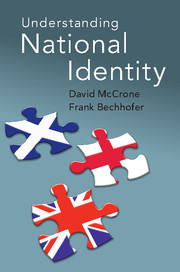Book contents
- Frontmatter
- Contents
- List of tables
- Preface
- Introduction
- 1 Thinking about national identity
- 2 Accessing national identity
- 3 National identity: do people care about it?
- 4 Debatable lands: national identities on the border
- 5 Claiming national identity
- 6 The politics of national identity
- 7 The notional other: ethnicity and national identity
- 8 A manner of speaking: the end of being British?
- 9 Whither national identity?
- Appendix National identity publications
- Bibliography
- Index
8 - A manner of speaking: the end of being British?
Published online by Cambridge University Press: 05 April 2015
- Frontmatter
- Contents
- List of tables
- Preface
- Introduction
- 1 Thinking about national identity
- 2 Accessing national identity
- 3 National identity: do people care about it?
- 4 Debatable lands: national identities on the border
- 5 Claiming national identity
- 6 The politics of national identity
- 7 The notional other: ethnicity and national identity
- 8 A manner of speaking: the end of being British?
- 9 Whither national identity?
- Appendix National identity publications
- Bibliography
- Index
Summary
Running through many of the chapters, but not discussed in detail, has been a key question: have the British ceased to be British? In particular, have the Scots ceased to be British, and are there signs that the English are following the same path away from state identity?
Much of the debate about ‘being British’ has been driven by the politics surrounding the constitutional future of the United Kingdom and the possibility of Scottish independence. This has led, ineluctably, to assertions about the declining impact of Britishness, and how, in the interests of the Union, it might be revived. Being British has largely been viewed through a political prism, as if this is its essence, and that it follows that anyone claiming British identity must be in some sense a ‘unionist’, and not a ‘nationalist’. This, we believe, is too simple a view, or, rather, it ought to be seen as a question for research rather than being taken for granted.
It would be highly unusual, possibly unique, if a large and established West European state in the twenty-first century lost significant territory through secession. If Scotland did leave the Union following the referendum vote in September 2014, or in the following few years, there would still remain a large state of around 55 million people. Such loss of territory would be especially unusual if secession were to be driven by shifts in national identity, although we shall argue later that this intuitively attractive hypothesis is improbable.
The Union Flag is a recognised global icon, flown and worn on a variety of occasions. And yet, like the owl of Minerva, it may fly only at dusk, presaging the end of being British. Given that ‘Great Britain’, in one form or another, has existed since the Union of the English and Scottish Parliaments in 1707, it comes as something of a surprise to learn that it was not until 1975 that a historian, J. G. A. Pocock, a New Zealander to boot, made ‘a plea for a new subject’ – British history (Pocock, 1975).
- Type
- Chapter
- Information
- Understanding National Identity , pp. 164 - 187Publisher: Cambridge University PressPrint publication year: 2015

